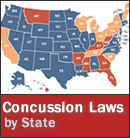Ohio Governor John Kasich signed his state’s youth-concussion legislation on Thursday, making Ohio the 44th state (including the District of Columbia) to have such a law to protect youth-athletes.
The new rules are set to go into effect on March 20, 2013, 90 days after the signing of the law.
Ohio’s legislation follows the National Football League’s model youth-concussion law, Washington state’s Lystedt Law, by requiring three things:
• Student-athletes aren’t allowed to participate in sports until a parent or guardian signs and returns a concussion information form;
• Student-athletes must be immediately removed from play when suspected of a concussion; and
• Student-athletes removed from play due to a concussion can’t return until being medically cleared by a licensed health care provider.

Both coaches and referees can pull a student-athlete out of a practice or game if he or she exhibits signs or symptoms of a concussion, and that player can’t return to play that day. Ohio’s law also requires all coaches and referees to complete a concussion training program at least once every three years.
Ohio’s law goes above and beyond the traditional Lystedt Law by extending past school sports into youth-sports organizations, such as Pop Warner or Little League. Only a handful of other states’ youth-concussion laws reach beyond school sports. (Pop Warner unveiled changes earlier this summer to address concussions, including banning coaches from using more than one-third of practice time for contract drills.)
“Traumatic brain injuries, or TBIs, we are learning from medical research are affecting thousands of children,” said one of the bill’s sponsors, state Rep. Sean O’Brien, to a local FOX affiliate. “By bringing this legislation out there, it is giving parents, coaches, and referees information about TBIs.”
Research released earlier in December from the Boston University Center for the Study of Traumatic Encephalopathy found evidence of long-term brain damage in six former high school football players who stopped playing before college. Only 38 percent of high school football players interviewed for a survey earlier this year expressed concern about the potential long-term ramifications of sports-related concussions, however.
The only states without youth-concussion laws as of Dec. 21, 2012 are Arkansas, Georgia, Mississippi, Montana, Tennessee, South Carolina, and West Virginia. Less than two years ago, only about a dozen states had such laws on the books.